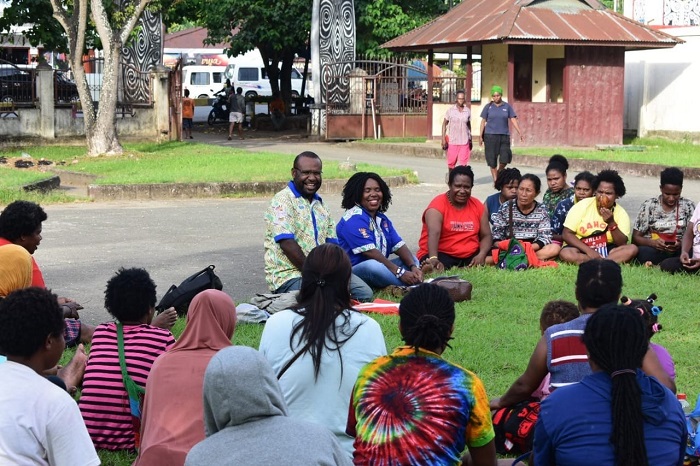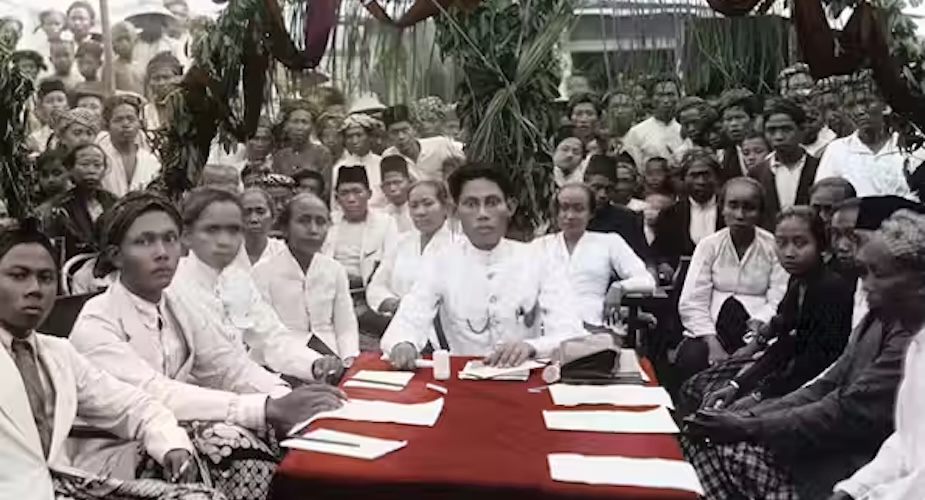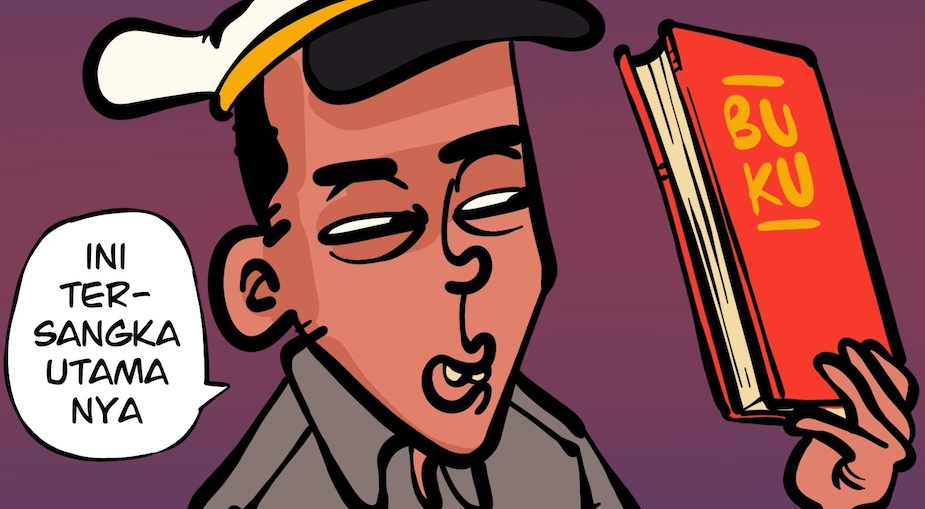Racist explanations hide policies and structures that contribute to poverty among Papuans
'I wish us Papuans to have a good home, have time with our families to go to church together on Sundays, and all of us work properly. Unlike today, we sell in the hot sun, get dust, get rain, sell at night with flashlights without electricity. We have young people who must wear good clothes, be neat and be in malls, hotels, the governor’s office, the regent's office. Son, I want to say, from the beginning of Otsus [Special Autonomy law], until it’s about to run out, Mama is still selling these betel nuts.'
- Betel nut seller in Jayapura, interview with Meki Wetipo, Feb 2021
The betel nut seller contrasts her unending, hot, dirty work with the neat, tidy, new employment spaces that young Papuans are not sufficiently able to access. Despite trillions of rupiah in Special Autonomy funds, mining income, and rich natural resources, the percentage of poor people in Tanah Papua (lit. Papuan lands, includes Papua and West Papua provinces) continues to increase, and is more than double the Indonesian national average. Increasing economic marginalisation attracts many perspectives. While policies and structures that contribute to poverty are often overlooked, dominant perspectives on poverty rely on racist explanations.
In 2012, former Vice President of Indonesia, Jusuf Kalla asserted, ‘The main problem in Papua is the high consumptive culture and low productivity of Papuans.’ Adding, ‘the productivity of our friends in Papua is low because their needs are few. [They need] simple clothes, simple and sufficient food. Sorry, but at the beginning of every month they drink a lot [of alcohol].’
A study from the Ministry of Home Affairs published in 2015 entitled, ‘Strategies to develop livelihoods in Papua’ argued that livelihoods are hampered by a supposedly ‘weak entrepreneurial spirit’. Despite also acknowledging problems such as lack of capital, lack of equipment, low quality and quantity of products, and difficult market access, this government study still blamed Papuans alleged capabilities for their poverty.
These racist statements from government officials are part of a long history of stigmatising Papuans as lazy, drunk, ignorant or dirty and denigrating their abilities. While nowadays there is more awareness of the racism that Papuans experience, in part due to movements like BLM and Papuanlivesmatter, racial stereotypes are not always obvious. The idea of ‘technocratic racism’ describes claims about people’s skills, aptitude, education or attitudes for technical, professional, and entrepreneurial work. For example, that they are not good with technology, cannot manage money or are ashamed to do business. Or, that they are good with money, technology, and business based on their cultural or ethnic background. These are both forms of racism and racialisation.
As British sociologist Gail Lewis explains, racialisation draws on old notions of race as a biological characteristic as well as new notions of culture as a marker of difference. There is no biological fact of race – human beings are all genetically interconnected, but ideas about race persist in the social imagination. As long as people believe that culture, ethnicity or skin colour determines capabilities, behaviours, motivations, way of thinking or lifestyle, then racism will persist.
Employment and race
In Papua, racism influences who gets a job opportunity. Data on indigenous employment could be extracted from the 2010 national census yet so far this type of analysis has not been undertaken. Both authors have lived and/or spent considerable time in Tanah Papua over the past decade and it has been our observation that in urban areas almost all the workers at the major private employers and resource companies, for example hotels, malls, supermarkets, mechanics, banks and construction, are non-Papuan. In Jayapura, we estimate that in the past decade there have never been more than a few Indigenous Papuans employed at the large malls (Mal Jayapura, Saga, Borobudur) or hotels (Swissbel, Aston, Grand Abe, Horizon).

While more research is needed to understand ethnic patterns of employment, we suggest that the racialisation of Papuan skills and capabilities, coupled with strong ethnic networks among newer migrants and lack of policies that regulate or guide employment, contribute to discrimination against Papuans. Javanese are now the largest ethnic group in West Papua province and the third largest group in Papua province. In Papua province the number of migrants from South Sulawesi is also considerable. These cultural groups are known throughout Indonesia for their trading and entrepreneurial skill, which may make them more attractive jobseekers and seem to provide a convenient, if racist, explanation for discrimination against Papuans.
Papuans are well aware of this racism. According to one local Papuan informant, ‘If you use the excuse that Papuans don’t want to work in malls or hotels, can’t stay long or focus, lower income or other reasons, those are just reasons from investors or others that don’t want to see us grow, compete with outsiders. They don’t want to accept us to work in their industrial services.’
Papuan men and women experience different forms and expressions of racism, so gender intersects with racial ideas to influence what opportunities they can access. For instance, Indonesian beauty ideals preference light skin, petite bodies and long straight hair. This affects which women are likely to be hired for service roles like front desk attendant or store assistant. Men are stigmatised as aggressive and non-compliant, so they are less likely to get a chance at professional, technical or service roles.
Protecting non-Papuan economic power
In regencies across Tanah Papua, the number of small migrant-owned shops is rapidly increasing. Hubikiak, a district outside Wamena, now has 350 kiosks; in another area of Jayawijaya regency, three kilometres of road is lined with new shops. Local policies and regulations have facilitated the granting of permits for these businesses, but why are so many being allowed? Questions could be asked about who develops and owns the blocks of shops and how much influence do they have over who is allowed to purchase a shop in the block? Who is able to access capital to purchase shops and stock? Who has better access to supply chains of imported goods?
Typically, migrant shops sell imported foods like rice; instant noodles; biscuits and soft drinks while Papuans sell local fruits and vegetables. Increasingly over the past five years however the migrant-owned shops also have begun selling local products like sago, betel nut, vegetables and fruits, thereby competing with Papuan livelihoods.
In contrast, Papuan traders, who are predominantly women, and referred to as ‘mama-mama Papua’, tend to sell their produce out in the open, on the roadside, in part due to a lack of market space. Activists lobbied for the need for designated marketplaces for Papuan traders and some were built. The marketplaces themselves have had limited success, however this agenda became a crucial part of public conversations about increasing Papuan economic marginalisation in an era of ‘Special Autonomy’ that was supposed to level the playing field with migrants.

During the 2014 election campaign President Jokowi embraced this cause and put his support behind a new marketplace in Jayapura. This was politically successful for him but the market failed to address the much larger problems – such as racism and unfair regulations – that contribute to Papuan economic marginalisation and poverty.
Anthropologist Heinzpeter Znoi describes how a few years ago, Papuan commercial agriculture experienced a short-lived boom when PT Freeport Indonesia bought the vegetables to feed their workforce at the Grasberg mine. But local producers were soon side lined when Freeport sold the business to a politically well-connected contractor from Jakarta who imported vegetables from Sulawesi instead. Znoi argues that the crisis in highland Papuan agriculture is partly due to unfair competition and denial of market access.
It is not only policy that allows economic dominance to accumulate. We question how the dominance of migrants, especially as street-side commercial merchants, affects Papuan desires to participate in this increasingly prevalent form of street economy. Given the racialisation of Papuans as supposedly lacking in entrepreneurial abilities, and the ongoing experience of ethnic tensions and violence, do Papuans feel like they belong in and have a right to, these urban economic spaces?
This is especially important to consider as the military and police (migrant-dominated institutions) are also increasingly economically active in the urban street economy, selling food, produce, merchandise and services. This activity is not illegal, but it reinforces the idea that the urban street economy, like working at the mall or a hotel, is not for Papuans.
Advocacy, development and inclusivity
Advocates like Papuan researchers Ludia Wambrauw and Elisabeth Maret recognise the expertise and important role of indigenous Papuans in economic development that is sustainable and aligns with their diverse values. It is crucial that other stakeholders – local and national government and migrants – change their perceptions of Papuans.

In 2006, Joni W. Haluk and friends established the Papua Council of Indigenous Entrepreneurs (Kamar Adat Pengusaha Papua – KAP Papua) to challenge racist attitudes toward Papuan capabilities and to help locals compete with migrants economically, especially as contractors, consultants and in the production of goods and services. KAP Papua has about 2100 members in 42 regions of Papua and West Papua province, most being contractors.
KAP Papua assists market sellers to form cooperatives and other organisations that can help improve their market access and profit. Recently their work has focused on supporting Papuan women market sellers in Jayapura at Expo Waena by facilitating discussion of how to improve the market space. They are also advocating for and supporting the implementation of existing policies on (1) promoting the community-based economy (Peraturan Daerah Khusus (Perdasus), The Special Regulations Number 18 Year 2008 about Community Based Economy (Perekonomian Berbasis Kerakyatan). Perdasus 18 (2008) and (2) the procurement of government goods/services (Presidential regulation 17 2019) so that these regulations benefit Papuan entrepreneurs.
By acknowledging the policies and structures that disadvantage indigenous sellers, these activities challenge the racist explanation that Papuans are not suited for business or are not entrepreneurial. To confront racism and improve Papuan economic participation, we need to know more about how policies that protect migrants and the military and police affect Papuan employment, business and aspirations. Through these policies and myths, Papuans are put into the roles of consumers rather than producers, and recipients rather than actors. Racism is used to justify and allow exclusion, inequities and non-Papuan dominance. This translates not just into poverty, but into strategies for economic development that do not include Papuan perspectives, values or experiences.
Meki Wetipo is Director Executive of KAP Papua. Jenny Munro (jenny.munro@uq.edu.au) is Senior Lecturer in Anthropology at the University of Queensland.












